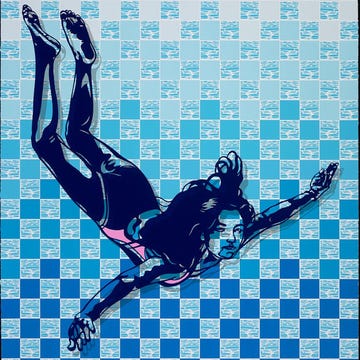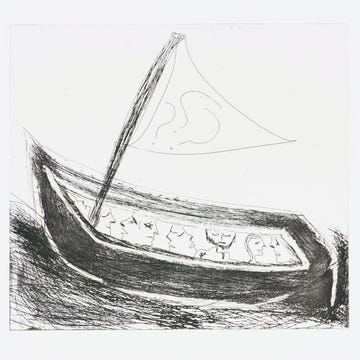Nobody else was stupid enough to write John Williams’s biography.
The fact is, the composer behind some of the most memorable film scores of the past 50 years had always defiantly resisted all attempts at a biography or documentary. He has always been an intensely private person—happy to talk about his music but loath to drop the guard on his personal life or his feelings.
Many biographers made passes over the decades. This was, after all, the most Oscar-nominated individual in history: the musical wizard behind the scores for Star Wars, Indiana Jones, Jaws, Jurassic Park, Harry Potter, Schindler’s List, and countless other melodic totems of the cinema age. Williams’s pop culture impact is simply staggering, and he routinely sells out venues like the 17,000-seat Hollywood Bowl even in his 90s, eliciting the kind of electric fan energy usually reserved for young, charismatic pop stars.
But everyone who knocked at the gate was turned away. He didn’t want that kind of spotlight, and looking backward could pause his current work. So many writers and filmmakers slunk back home, respectfully but sadly.
My own “stupidity” might more charitably be called perseverance, or obstinance—or, to borrow an old biblical term, importunateness. It was born of and fueled by passion, an obsessive love of Williams’s music that began when I was nine and never dimmed but only grew. I became a film-music journalist because of him, moved to Los Angeles because of him. And besides a desire to evangelize and explain his (and other film) music to a wide audience, I wanted to get nearer to him.
I embarked on the project of writing his biography, with tentative interest from Oxford University Press, in early 2020—always with the hope that he could be persuaded to participate. I wrote a detailed proposal with a full sample chapter, interviewing some of his collaborators, and earned a contract with OUP. But when I nervously brought my request to the man himself—or rather, to his gatekeepers—I was given the same answer that befell all those who dared knock before me: It’s not personal. He just doesn’t want this to happen.
“If I wrote it anyway, without his participation, would he try and stop me?” I asked. No. “But, how would he feel? He...wouldn’t be pleased.
I decided to proceed anyway. I combed through the archives of Hollywood trades and of all the historical dailies and chronicles made searchable by Newspapers.com. Williams had given a shocking number of interviews over the years—going all the way back to high school, when a Time magazine reporter covered his teen jazz exploits in 1949. There was no shortage of information to be gleaned from archived radio interviews, behind-the-scenes featurettes on DVDs, and filmed chats with everyone from Gene Shalit to Williams’s longtime friend, the conductor André Previn. For a famously private person, he had actually been rather public.
I scoured special collections in libraries and found some revelatory (or just plain fun) correspondence, contracts, doodles, photos, and music tapes in stacks from Westwood to Indiana to New York. In one letter he wrote from London in 1969, he charmingly described himself responding “like a schoolgirl” when he met Sir William Walton, one of his composer heroes.
In addition, I constructed my own oral history—interviewing some 175 people by Zoom, over the phone, or in homes or coffee shops. Directors he worked with, musicians who frequently played for him, guys from his high school class or his air force band. I interviewed Richard Dreyfuss, who told me that the outsize power of the Jaws score convinced him that auteur theory was bunk; I talked to Mia Farrow, who, once married to Previn, has remained Williams’s friend and still calls him Johnny. Some of his oldest collaborators and friends spoke to me mere months before they died.
I was rebuffed by a few potential interviewees and ignored by others. When some people learned that Williams was not participating, they closed the door on me. I couldn’t blame them. I didn’t want to scare participants away, but I also didn’t want to lie or mislead. Plus, it just made me sad that I was writing this epic love letter to my idol—and my idol was (supposedly) not pleased about it.
I wrote two letters to Williams, one year apart, and sent them to his home address. I wanted to make a personal, emotional appeal, heart to heart, about why I was doing this and why I thought he should be involved. I heard nothing back, and soon more obstacles were engineered by his team—telling certain people not to talk to me, preventing me from accessing the archive at the Boston Symphony Orchestra (Williams did not respond to Alta’s request for comment). I was nearing my deadline, and it looked as though his mind would never change...
And then, one day in early October 2022, I received a mysterious invitation to meet him at his office on the Universal Studios lot.
The rest of the story is a book unto itself. The CliffsNotes version: Williams told me he realized I was going to write this book regardless and that he had heard good things about me from his younger brother Don. He figured we should “get to know each other a little.” He was clearly ill at ease with the whole situation, but, as fate would have it, he was currently being pressured by his old friend Steven Spielberg to participate in a documentary about his career. He had also just turned 90, and his film-scoring work was naturally slowing. The confluence of all these factors (and maybe that star I wished on when I was a boy) cracked open a door that, eventually, swung wide open.
The result is a book—John Williams: A Composer’s Life—that is much better than the one I was on track to write without his involvement, and one I am very proud of. It can never be “definitive,” and Williams remains a mystery to me in a myriad of ways, and thus to the reader. But hopefully—through rigorous research, good old shoe-leather journalism, unique access to Williams himself, and a life-load of wild zeal for his music—my biography will let readers feel like they got pretty close to knowing him.
I’m glad I was so stupid.•
JOHN WILLIAMS: A COMPOSER’S LIFE
September 2, 2025
Oxford University Press
Tim Greiving is a film music journalist in Los Angeles. He contributes to the Los Angeles Times and NPR and teaches film music courses at the University of Southern California.













